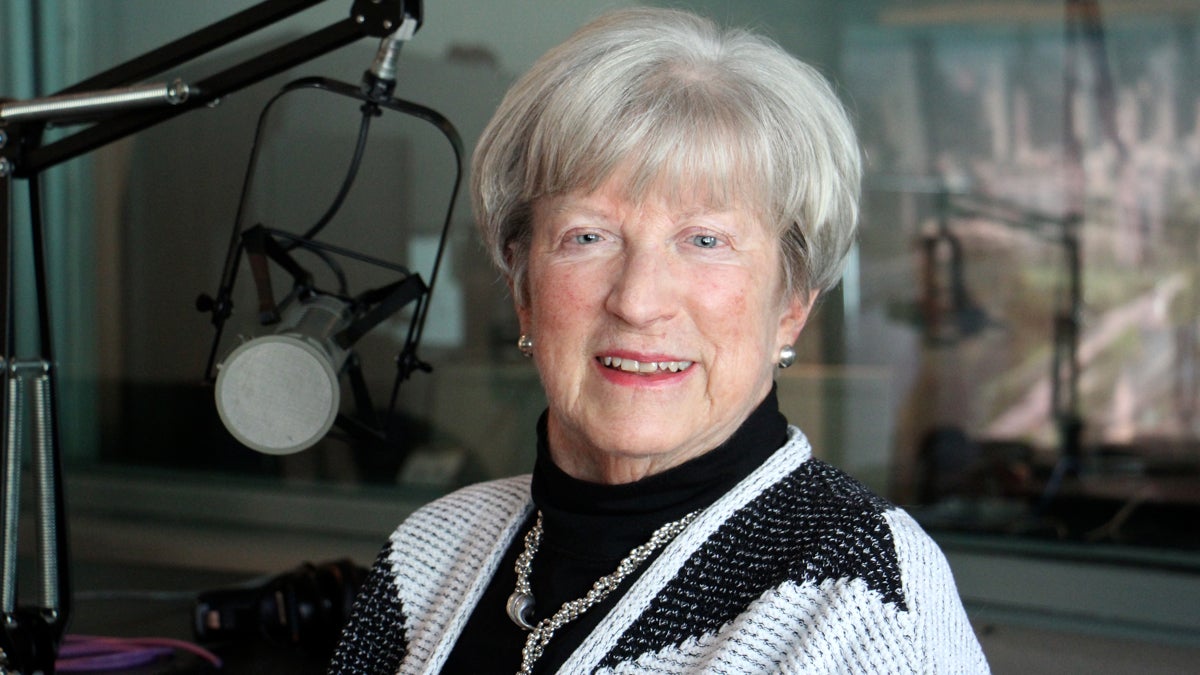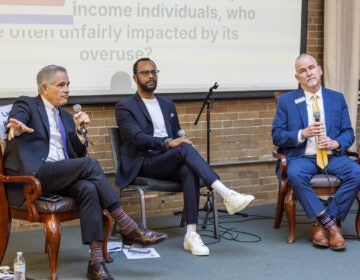The Kavanaugh case: Trouble for GOP in midterms?
Spurred by Anita Hill's treatment at the Thomas hearings, Lynn Yeakel ran for U.S. Senate in '92. She nearly unseated U.S. Sen. Arlen Specter, one of Hill's questioners.
Listen 4:05
Lynn Yeakel, who nearly defeated U.S. Sen. Arlen Specter in 1992, says she’s in no position to judge the merits of the Kavanaugh case, but she wishes it would be considered in a thorough, nonpartisan process. (Emma Lee/WHYY)
Will the sexual assault allegation against U.S. Supreme Court nominee Brett Kavanaugh turn this election year into a nightmare for Republicans?
We can’t tell yet, but it’s clear GOP strategists are being careful to avoid repeating what was regarded by many women as demeaning treatment given to Anita Hill in 1991, when she alleged that then-nominee, now-Associate Justice Clarence Thomas sexually harassed her.
I noticed that it was before noon on Monday when Pennsylvania Republican U.S. Senate candidate Lou Barletta, a congressman and ardent supporter of President Donald Trump, issued a statement saying that the allegations of Christine Blasey Ford must be taken seriously — and that Kavanaugh and his accuser should appear before the Senate Judiciary Committee.
Barletta’s veteran media consultant, John Brabender, made it clear that in this climate, Republicans have to be respectful of any woman making allegations of sexual misconduct.
“Campaigns particularly have to be extremely sensitive and careful,” he said, “because you certainly do not want to be put into a position that looks like you’re dismissing any charges that are being brought.”
That said, Brabender added that he believed Democrats had manipulated the timing of the release of the accusation to delay and derail Kavanaugh’s nomination, and it’s fair to call them out for exploiting the issue for political gain.
Democrats have a different narrative about the nomination hearings and the way the allegation surfaced, of course.
Remembering when
I spoke this week to Lynn Yeakel, whose 1992 U.S. Senate campaign was triggered by Hill’s treatment at the Thomas hearings.
“I was horrified at the way she was being challenged and questioned and accused of lying by this all-male Judiciary Committee,” Yeakel said.
She wondered if another woman would step forward to challenge Pennsylvania U.S. Sen. Arlen Specter, who’d led the Republican grilling of Hill.
When no one did, she took the plunge.
“My first campaign ad in the primary started with a scene from the judiciary hearings with Sen. Specter questioning Anita Hill,” Yeakel recalled, “and I said, ‘Did this make you as angry as it made me?’ ”
Neil Oxman was the media consultant for Yeakel’s campaign. At the time, he said, Yeakel was trailing badly in the Democratic primary.
“She was completely unknown. No one knew her outside of a few friends,” Oxman told me. “That ad made her go from 3 percent of the vote to 45 percent of the vote in the three-way race in 17 days. I mean, she won the primary overwhelmingly, walking away.”
The ad clearly tapped a deep well of anger. Yeakel fell 2 points short of unseating Specter, but four Democratic women were elected to the Senate, one reason 1992 was dubbed “the year of the woman.”
That’s a scenario that could give Republicans nightmares this year, when they’re already concerned about a rise in Democratic enthusiasm, and the impact of an unpredictable president on the votes of independents and moderates.
That was then
Both Republican and Democratic consultants and candidates I spoke with were cautious about predicting how the Kavanaugh controversy could affect the midterms.
Republican communications strategist Charlie Gerow said the party doesn’t have much to worry about here.
“The congressional Republicans aren’t really affected by this. It’s the Senate Republicans who are, and they have a relatively small number of seats to defend,” Gerow said.
Further, he argued, the confirmation hearings offered a “despicable view of the Democrats nationally … letting their histrionics be on full display, and their many protesters in the back of the room.”
Yeakel and two Democratic women running for Congress in the region were reluctant to predict anything about the impact of the Kavanaugh hearings.
But state Rep. Madeleine Dean, one of four Democratic women on the ballot for Congress in Southeastern Pennsylvania, said she thinks the episode will be on the minds of voters.
“I believe it will, and a lot will depend upon what kind of a full and fair hearing Ford gets,” she said. “If this is not done fairly and transparently, people are going to be motivated in all different kinds of ways.”
Yeakel said she’s in no position to judge the merits of the Kavanaugh case, but she wishes it would be considered in a thorough, nonpartisan process.
“The issue is polarizing, and it shouldn’t be,” she said. “It should be about fairness, and about gender equality, and figuring out what the best answer is without concern over whether it’s going to damage your campaign.”
I pointed out to Oxman that it’s been a volatile election season, where it seems one big story gets replaced by another every few days, which makes it hard to know whether the Kavanaugh accusation will have lasting impact.
“That’s a good question,” Oxman said. “Certainly this story has had legs this week and will have legs next week. The question, really, is how angry are moderate women voters about this?”
My take
I think the Kavanaugh case could have impact on the scale of the Anita Hill story, but only if Ford appears in a televised hearing.
Right now her story is well known, but she isn’t.
The only adult photo of her in media reports shows her in big sunglasses. You can’t see her eyes.
If she tells her story in a public hearing and, like Hill, presents herself as smart, composed person who is sure of her experience and committed to the facts, it could be devastating.
Anita Hill didn’t motivate a generation of women because her accusations were proved beyond a doubt or affirmed by a jury. It was because people believed her.
If Ford connects the same way and the Republican majority dismisses her, however respectfully, it will not be good for the party anywhere.
WHYY is your source for fact-based, in-depth journalism and information. As a nonprofit organization, we rely on financial support from readers like you. Please give today.





